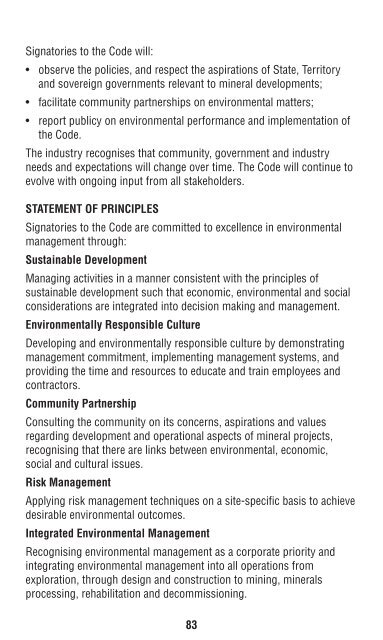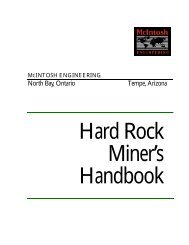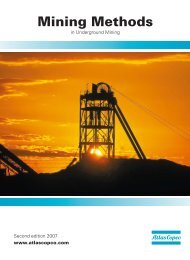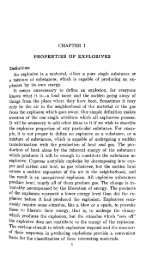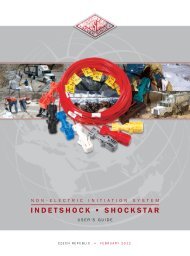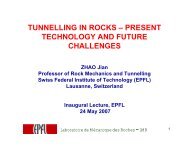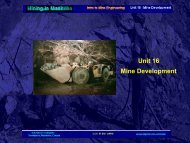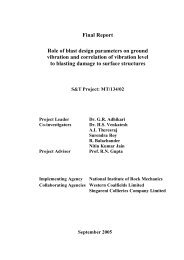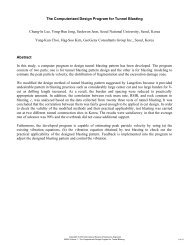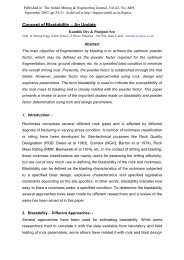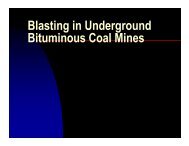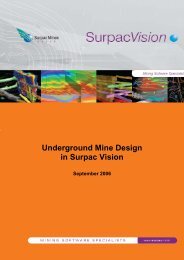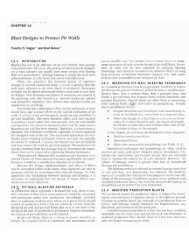Mine Rehabilitation Handbook - Mining and Blasting
Mine Rehabilitation Handbook - Mining and Blasting
Mine Rehabilitation Handbook - Mining and Blasting
You also want an ePaper? Increase the reach of your titles
YUMPU automatically turns print PDFs into web optimized ePapers that Google loves.
Signatories to the Code will:<br />
• observe the policies, <strong>and</strong> respect the aspirations of State, Territory<br />
<strong>and</strong> sovereign governments relevant to mineral developments;<br />
• facilitate community partnerships on environmental matters;<br />
• report publicy on environmental performance <strong>and</strong> implementation of<br />
the Code.<br />
The industry recognises that community, government <strong>and</strong> industry<br />
needs <strong>and</strong> expectations will change over time. The Code will continue to<br />
evolve with ongoing input from all stakeholders.<br />
STATEMENT OF PRINCIPLES<br />
Signatories to the Code are committed to excellence in environmental<br />
management through:<br />
Sustainable Development<br />
Managing activities in a manner consistent with the principles of<br />
sustainable development such that economic, environmental <strong>and</strong> social<br />
considerations are integrated into decision making <strong>and</strong> management.<br />
Environmentally Responsible Culture<br />
Developing <strong>and</strong> environmentally responsible culture by demonstrating<br />
management commitment, implementing management systems, <strong>and</strong><br />
providing the time <strong>and</strong> resources to educate <strong>and</strong> train employees <strong>and</strong><br />
contractors.<br />
Community Partnership<br />
Consulting the community on its concerns, aspirations <strong>and</strong> values<br />
regarding development <strong>and</strong> operational aspects of mineral projects,<br />
recognising that there are links between environmental, economic,<br />
social <strong>and</strong> cultural issues.<br />
Risk Management<br />
Applying risk management techniques on a site-specific basis to achieve<br />
desirable environmental outcomes.<br />
Integrated Environmental Management<br />
Recognising environmental management as a corporate priority <strong>and</strong><br />
integrating environmental management into all operations from<br />
exploration, through design <strong>and</strong> construction to mining, minerals<br />
processing, rehabilitation <strong>and</strong> decommissioning.<br />
83<br />
Performance Targets<br />
Setting environmental performance targets not necessarily limited to<br />
legislation, licence <strong>and</strong> permit requirements.<br />
Continual Improvement<br />
Implementing management strategies to meet current <strong>and</strong> anticipated<br />
performance st<strong>and</strong>ards <strong>and</strong> regularly reviewing objectives in the light of<br />
changing needs <strong>and</strong> expectations.<br />
<strong>Rehabilitation</strong> <strong>and</strong> Decommissioning<br />
Ensuring decommissioned sites are rehabilitated <strong>and</strong> left in a safe <strong>and</strong><br />
stable condition, after taking into account beneficial uses of the site <strong>and</strong><br />
surrounding l<strong>and</strong>.<br />
Reporting<br />
Demonstrating commitment to the Code’s principles by reporting the<br />
company’s implementation of the Code <strong>and</strong> environmental performance<br />
to governments, the community <strong>and</strong> within the company.<br />
SYSTEMS AND PROCESSES<br />
The systems <strong>and</strong> processes relevant to each Principle are:<br />
Sustainable Development<br />
Managing activities in a manner consistent with the principles of<br />
sustainable development such that economic, environmental <strong>and</strong> social<br />
considerations are integrated into decision making <strong>and</strong> management.<br />
1. Support activities to improve knowledge of the short- <strong>and</strong> long-term<br />
availability <strong>and</strong> use of mineral resources.<br />
2. Promote reuse <strong>and</strong> recycling of mineral products <strong>and</strong> by-products to<br />
maximise their utility to current <strong>and</strong> future generations.<br />
3. Pursue cleaner production through research, technological<br />
innovation, operational efficiencies <strong>and</strong> waste minimisation.<br />
4. Recognise the maintenance of ecological <strong>and</strong> cultural heritage<br />
values as an important consideration in sustainable development.<br />
Environmentally Responsible Culture<br />
Developing an environmentally responsible culture by demonstrating<br />
management commitment, implementing management systems, <strong>and</strong><br />
providing the time <strong>and</strong> resources to educate <strong>and</strong> train employees <strong>and</strong><br />
contractors.<br />
84


